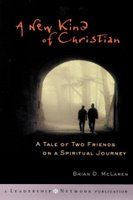 I have begun A New Kind of Christian by Brian McLaren. I really have enjoyed some of the insights that McLaren brings to the theological table. We have, in American Evangelical Christianity, read ideals into the Bible that are not there. As an example, many American Christians view democracy as the biblical standard of civil government. In the Middle-Ages the divine right of kings was seen as the biblical standard. We are called to examine these ideas in the light of the Word of God.
I have begun A New Kind of Christian by Brian McLaren. I really have enjoyed some of the insights that McLaren brings to the theological table. We have, in American Evangelical Christianity, read ideals into the Bible that are not there. As an example, many American Christians view democracy as the biblical standard of civil government. In the Middle-Ages the divine right of kings was seen as the biblical standard. We are called to examine these ideas in the light of the Word of God.Some of the ideas that I am not persuaded by include the idea that Modernity (and the Christianity that fits into it) found its fullness in 19th century rationalism. Most of the book thus far, argues that this is the fullness of Modern Christianity and we interpret our experiences and our understanding of Scripture from this vantage point.
I would argue that there was a decline in Christianity and its adherence to the Word of God after the end of the 17th century. Thus making Modernity itself a falling away from the biblical standard. We are called to a personal as well as a communal relationship with Christ. Modernity stresses the personal at the expense of the communal. Although much fruit for the sake of the Gospel has been produced after the 17th century- Christianity was at its height as a spiritual and cultural power prior to this time.
There are many things that I have enjoyed about the book but I think that McLaren is missing the mark. McLaren challenges Christians to take the leap from Modernity to Post-Modernity to aid in our understanding of culture and Scripture- but I would find the biblical challenge to be to jump out of Modernity and Post-Modernity into an eternal perspective from which to view the world, the Church, and the cultures around us.






